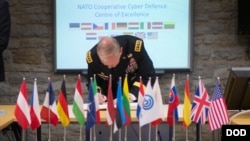These days, it seems like nowhere in the cyber realm is safe.
Hacks have infiltrated all walks of cyber life, from the email system used by the Joint Chiefs of Staff’s office at the Pentagon, to the cheating spouses on the Canada-based Ashley Madison website.
But the NATO Cooperative Cyber Defense Center of Excellence, in the tiny country of Estonia, is trying to make the cyber world safer for all of NATO.
“When it comes to the NATO networks and how we fight together, there are 28 doors to this alliance. If one of those doors is wide open, the alliance is wide open,” General Phil Breedlove, the commander of U.S. European Command, told VOA Saturday at a NATO defense meeting in Istanbul.
Defense Center role
The Cyber Defense Center provides cyber security defense and policy advice to participating members of NATO and a handful of other partner countries, academia and even private businesses.
“The private sector is the one that owns most of the real stuff, right? All the network cables, usually the server rooms, and more," said Lauri Aasmann, Law and Policy Branch chief for the Center.
The Center is not funded by NATO, but by volunteer nations. Although it is not responsible for NATO’s cyber security, officials say its work has played a significant role in improving the alliance’s cyber defense capabilities.
Its annual exercise, dubbed Locked Shields, is a multi-national war game in which participants try to protect a fictitious country from a cyber attack. The center provides the fictitious country’s network, which participating nations must patch up and strengthen.
Aasmann said the attack creators on the red team, a mix of tech wizards from different NATO allies, are critical to defense building.
“We strongly believe that in order to build or have a good defense, you should understand how the attack works, how the offense works,” said Aasmann.
Why Estonia?
Estonia is among the best in the world for Internet access, with WiFi available almost everywhere, even in uncommon places like inside buses and vans or on a public beach.
It’s second globally for Internet freedom, according to the latest Freedom House report. In comparison, the United States ranks fifth on that list.
Banking is done mostly online, with locals saying they rarely carry cash.
Most of the government is run electronically as well.
“Even if little green men came over and took over everything, people could still pay their taxes online; they could still vote online; you could have a complete government in exile,” said one U.S. official based in Estonia, referring to the term used for Russian military men seen in Ukraine’s Crimean peninsula during Russia’s annexation of the region.
Russian attack
But Estonians know from experience that a cyber attack on their Internet utopia could prove catastrophic.
A massive cyber attack in 2007 knocked out Internet access to banks, ministries, parliament and several other organizations for days. The attack hit during Estonia’s spat with Russia about the relocation of a Soviet-era grave marker called the Bronze Soldier of Tallinn, and many blamed the attack on Estonia’s eastern neighbor.
“Most people say this is the first actual state-sponsored cyber attack that came from Russia,” the U.S. official said.
Since the “wakeup call,” as Aasmann called it, the country remains dedicated to efforts to prevent and defeat cyber war against Estonia and its allies.





